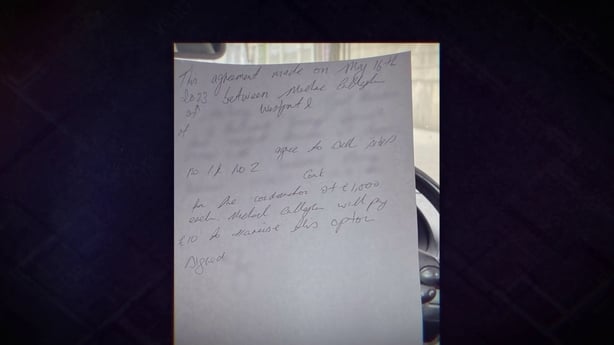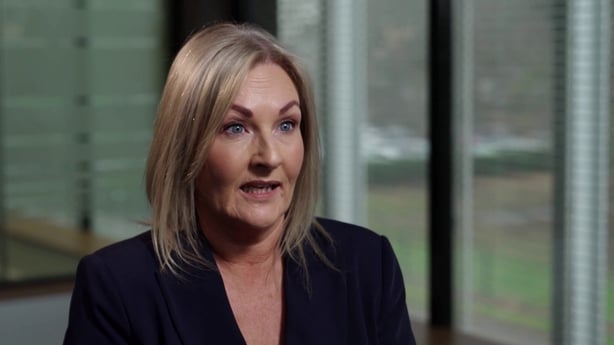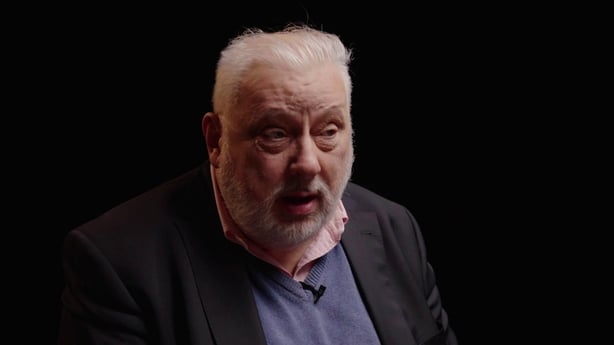Serial planning objectors John and Micheál Callaghan not only wanted a payoff from a developer to withdraw an objection, they also sought an option to buy sites in the same housing development to which they were objecting for a nominal fee.
The extraordinary deal is documented in memos, phone records and pictures that have been obtained by RTÉ Investigates.
A meeting between the developer and the Callaghans was also observed by Independent TD Verona Murphy.
The developer, who asked not to be named, originally offered to pay the Callaghans €10,000 in return for them withdrawing an appeal against a large residential development.
But the Callaghans said the price should be €100,000.
After much haggling the Callaghans agreed to settle for €50,000, as long as it was all in cash, according to our sources.
However, on the day, the developer could only raise €11,000 in cash.
So, John Callaghan introduced an extraordinary feature in the deal.
He said the Callaghans should get an option to buy two sites in the same housing development that they had lodged an appeal against, according to documents obtained by RTÉ Investigates.
John Callaghan then drafted a handwritten agreement, which gives his brother Micheál an option to buy sites for two houses in the development for just €1,000 each. The sites were considered to be worth up to €50,000 each at the time.

Micheál and John Callaghan were photographed on the day of the meeting with the developer, which took place just outside the offices of the planning appeals board, An Bord Pleanála on the day the appeal was withdrawn on 16 May this year.
An important witness to some of the events that took place that day is Independent TD Verona Murphy.
In an interview with RTÉ Investigates, she revealed how she was contacted by the developer who told her he was facing a mischievous planning appeal.
The Wexford TD had agreed to meet the developer after a planned meeting with the Callaghans.
"The builder had explained to me over the phone and at different times what was actually going on," Ms Murphy said.
"I had been contacted by the builder that morning to say that he had arranged a meeting. And that after the transaction had taken place, would I meet him. And he'd go through it.
"I was making my way to the hotel when I actually saw two men and the builder walking in my direction albeit on the far side of the road. So, I was obviously early."

Ms Murphy had just stumbled upon the transaction as it was about to unfold.
John Callaghan's Mercedes car was parked only yards from the entrance to An Bord Pleanála.
"They opened the back door of a Mercedes car and the builder got in with the two gentlemen and I was a little taken aback. I wasn't expecting it," the Wexford TD told RTÉ Investigates.
Inside the car, the Callaghans agreed a deal with the developer, and the next stage was for the appeal to be withdrawn. The TD then witnessed Micheál Callaghan leave the car.
"The man got out of the car and walked way past me down towards an Bord Pleanála and then I saw him come back to the car with the piece of paper and I assumed he was after withdrawing that," Ms Murphy said.
Minutes later, the developer got out of the car and met Ms Murphy and explained what had taken place.
"He said that he had given them a sum of money and he showed me a piece of paper. It basically said that they had an option agreement," she said.
She confirmed that the document she was shown, the option agreement to buy two sites in the development, was the same one obtained by RTÉ Investigates.
Ms Murphy said that she did not expect the events to unfold before her scheduled meeting with the developer.
"On the day, I was just expecting the builder to brief me afterwards. I wasn't expecting to come upon any of this," she said.
Ms Murphy later met an official of An Bord Pleanála, and raised the issue of an unnamed environmental group making mischievous, financially motivated appeals.
"I actually met a senior An Bord Pleanála official in the corridors of Leinster House, and we stopped and had a chat. I described the scenario," she said.
In a statement, An Bord Pleanála confirmed its former interim chairperson Oonagh Buckley had spoken with Ms Murphy, and that she was told about people making an appeal for financial gain.
However, the statement says An Bord Pleanála did not have sufficient information to take the matter further.
WATCH: RTÉ Investigates - The self-styled NGO withdrawing planning appeals for cash
Planning experts have described this particular deal involving the Callaghans as deeply damaging for the planning process.
Dr Paula Russell, Planning Lecturer at University College Dublin (UCD), said: "This is exploiting the system in a way that is completely unethical. What shocks me, or what annoys me about it, is that it then undermines trust in the system."
Gabriel Dennison BL, a former board member of An Bord Pleanála also spoke to RTÉ Investigates.
"If ever there was any kind of confirmation that his motivation is not legitimate or bona fide or whatever. I want to be part of your 'damaging project. Your project is going to damage the environment, which I'm so opposed to. Let me in. I want a piece of it, and then I'll be happy'. It's pretty disgusting, actually," Mr Dennison said.

According to documents supplied to RTÉ Investigates, the money was paid to a new company set up to facilitate the transaction, called Carbon Hunter Limited, and 24 hours later, John and Micheál Callaghan withdrew their appeal against a large commercial development.
Under the arrangement, John and Micheál Callaghan, through their company Carbon Hunter, were appointed as environmental consultants to the development.
However, it is understood that they had no role whatsoever in the development apart from to withdraw their planning appeal.
After getting the payment back in September, there was no further contact between John Callaghan and the development company, until Mr Callaghan received a right of reply letter from RTÉ Investigates.
Within hours of receiving our letter, we understand that John Callaghan made an unsolicited phone call to the developer and proceeded to offer him technical advice which the developer did not want.
We asked both John and Micheál Callaghan about payments they received from developers. We also put it to them that, based on our evidence, their planning appeals were not motivated by environmental concerns — but were instead intended to secure money in return for the withdrawal of their appeals.
In a response to our letters, we received a one-line statement from John Callaghan, saying: "Please be aware that neither of the parties referred to in your letters has done anything unlawful."
Commenting on the activities of the Callaghans, Ms Murphy said: "Whether it's unlawful or not, it is morally reprehensible and absolutely despicable.
"I feel that as we are in the middle of the worst housing crisis this country has ever known, we need to solve the issue, because I think there are legitimate complaints, and I wouldn't want anybody to think that these are legitimate complaints."
Watch RTÉ Investigates: The Planning Trap on the RTÉ Player here.






